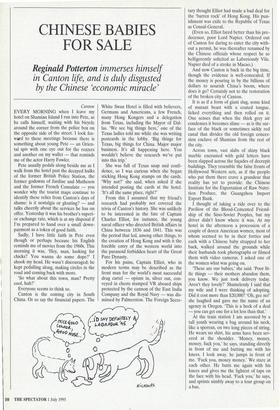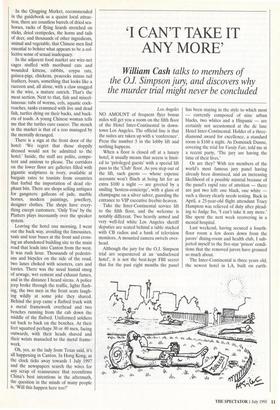CHINESE BABIES FOR SALE
Reginald Potterton immerses himself in Canton life, and is duly disgusted by the Chinese 'economic miracle'
Canton EVERY MORNING when I leave my hotel on Shamian Island I run into Pete, as he calls himself, waiting with his bicycle around the corner from the police box on the opposite side of the street. I look for- ward to these meetings because there is something about young Pete an Orien- tal spiv with one eye out for the rozzers and another on my wallet — that reminds me of the actor Harry Fowler.
Pete usually pedals along beside me as I walk from the hotel past the decayed hulks of the former British Police Station, the former godowns of Jardine and Matheson and the former French Consulate — you wonder why the tourist maps continue to identify these relics from Canton's days of shame: is it nostalgia or gloating? — and talks cheerily about the services he has on offer. Yesterday it was his brother's superi- or exchange rate, which is at my disposal if I'm prepared to hand over a small down- payment as a token of good faith.
Sadly, I have little faith in Pete even though or perhaps because his English reminds me of movies from the 1960s. This morning it was, 'Hey, man, looking for chicks? You wanna do some dope?' I shook my head. He wasn't discouraged; he kept pedalling along, making circles in the road and coming back with more.
`So what about this town, man? Pretty cool, huh?'
Everyone seems to think so.
Canton is the coming city in South China. Or so say the financial papers. The White Swan Hotel is filled with believers, Germans and Americans, a few French, many Hong Kongers and a delegation from Texas, including the Mayor of Dal- las. 'We see big things here,' one of the Texas ladies told me while she was writing postcards in the lobby. 'Big things for Texas, big things for China. Major major business. It's all happening here. You wouldn't believe the research we've put into this trip.'
She was full of Texas snap and confi- dence, so I was curious when she began sticking Hong Kong stamps on the cards. `Why not?' she said, when asked if she intended posting the cards at the hotel. `It's all the same place, right?'
From this I assumed that my friend's research had probably not covered the trivia of Canton's history. She was unlikely to be interested in the fate of Captain Charles Elliot, for instance, the young naval officer who directed British affairs in China between 1836 and 1841. This was the period that led, among other things, to the creation of Hong Kong and with it the forcible entry of the western world into the paranoid forbidden heart of the Great Pure Dynasty.
For his pains, Captain Elliot, who in modern terms may be described as the front man for the world's most successful drug cartel — opium in, silver out, con- veyed in chests stamped VR aboard ships protected by the cannon of the East India Company and the Royal Navy — was dis- missed by Palmerston. The Foreign Secre- tary thought Elliot had made a bad deal for the 'barren rock' of Hong Kong. His pun- ishment was exile to the Republic of Texas as Consul-General.
(Even so, Elliot fared better than his pre- decessor, poor Lord Napier. Ordered out of Canton for daring to enter the city with- out a permit, he was thereafter renamed by the Chinese officials whose respect he so belligerently solicited as Laboriously Vile. Napier died of a stroke in Macao.) And now Canton is back in the big time, though the evidence is well-concealed. If the money is pouring in by the billions of dollars to nourish China's boom, where does it go? Certainly not to the restoration of the broken city of Canton.
It is as if a form of giant slug, some kind of mutant beast with a coated tongue, licked everything and then rolled on it. One senses that when the thick grey air condenses it becomes slime — as is the sur- face of the black or sometimes sickly red canal that divides the old foreign conces- sion enclave of Shamian from the rest of the city.
Across town, vast slabs of shiny black marble encrusted with gold letters have been slapped across the façades of decrepit buildings. They resemble the false fronts of Hollywood Western sets, as if the people who put them there crave a grandeur that reality has yet to provide: the Chinese Institute for the Exportation of Raw Nutri- tion Produce, the Guangzhou Import Export Bank.
I thought of taking a ride over to the Pavilion of the Blood-Cemented Friend- ship of the Sino-Soviet Peoples, but my driver didn't know where it was. At my hotel in the afternoon a procession of a couple of dozen American women, most of whom seemed to be in their forties and each with a Chinese baby strapped to her back, walked around the grounds while their husbands took photographs or filmed them with video cameras. I asked one of the women what was going on.
`These are our babies,' she said. 'Poor lit- tle things — their mothers abandon them, you know. We just took delivery today. Aren't they lovely?' Shamelessly I said that my wife and I were thinking of adopting. Did it cost more than $20,000? 'Oh, gee no!' she laughed and gave me the name of an agency in Oregon. 'This is a heck of a deal — you can get one for a lot less than that.'
At the train station I am accosted by a tall youth wearing a bag around his neck, like a sporran, on two long pieces of string. He wears no shirt, his arms have been sev- ered at the shoulder. 'Money, money, money, fuck you,' he says, standing directly in front of me and butting me with his knees. I look away, he jumps in front of me. 'Fuck you, money money.' We stare at each other. He butts me again with his knees and gives me the lightest of taps on the face with his head. 'Fuck you,' he says, and sprints nimbly away to a tour group on a bus. In the Qingping Market, recommended in the guidebook as a quaint local attrac- tion, there are countless barrels of dried sea- horses, racks of flying lizards stretched on sticks, dried centipedes, the horns and tails of deer, and thousands of other ingredients, animal and vegetable, that Chinese men find essential to bolster what appears to be a col- lective sense of sexual inadequacy.
In the adjacent food market are wire-net cages stuffed with moribund cats and wounded kittens, rabbits, coypu rats, guinea-pigs, chickens, peacocks minus tail feathers, boars, something that looks like a raccoon and, all alone, with a claw snagged in the wire, a mature ostrich. That's the meat section. Next to that, fish and miscel- laneous: tubs of worms, eels, aquatic cock- roaches, tanks crammed with live and dead fish, turtles dying on their backs, and buck- ets of toads. A young Chinese woman tells me that the turtles cure cancer. The stench in the market is that of a zoo managed by the mentally deranged.
There is a sign at the front door of the hotel: 'We regret that those sloppily dressed would not be admitted to the hotel.' Inside, the staff are polite, compe- tent and anxious to please. The corridors on the lower floor are galleries filled with gigantic sculptures in ivory, available at bargain rates to tourists from countries that forbid the importation of dead ele- phant bits. There are shops selling antiques for gangsters: galleons of jade, marble horses, modern paintings, jewellery, designer clothes. The shops have every- thing except customers. 'Only You' by the Platters plays incessantly over the speaker system.
Leaving the hotel one morning, I went out the back way, avoiding the limousines, taxis and tour buses at the front and cross- ing an abandoned building site to the main road that leads into Canton from the west. It was rush hour. Thousands of pedestri- ans and bicycles on the side of the road, two lanes choked with scooters, cars and lorries. There was the usual humid smog of sewage, wet cement and exhaust fumes, and in the distance I heard sirens. A police jeep broke through the traffic, lights flash- ing, the two men in the front seats laugh- ing wildly at some joke they shared. Behind the jeep came a flatbed truck with a metal framework overhead and two benches running from the cab down the middle of the flatbed. Uniformed soldiers sat back to back on the benches. At their feet squatted perhaps 30 or 40 men, facing outwards, with their heads shaved and their wrists manacled to the metal frame- work.
Oh, yes, as the lady from Texas said, it's all happening in Canton. In Hong Kong, as the clock ticks away towards 1 July 1997 and the newspapers search the wires for any scrap of reassurance that reconfirms China's best intentions in the aftermath, the question in the minds of many people is, `Will this happen here too?'



































































 Previous page
Previous page